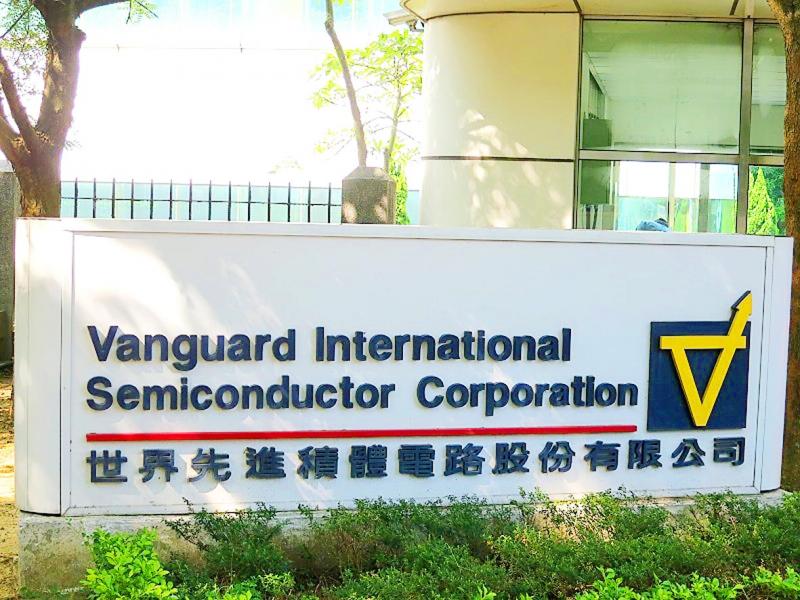Vanguard Semiconductor International Co (世界先進), which makes power management ICs and driver ICs for displays, yesterday said that net profit last quarter fell 1.4 percent from the previous quarter to NT$1.48 billion (US$49.27 million) as a newly acquired fab from GlobalFoundries Inc dragged down gross margin and prices.
Net profit was NT$1.5 billion in the fourth quarter of last year. Despite the quarterly decline, net profit rose 6.4 percent annually from NT$1.39 billion.
Earnings per share fell to NT$0.89 from NT$0.91 the previous quarter, but rose from NT$0.84 a year earlier.

Photo: Hung Yu-fang, Taipei Times
Gross margin dipped to 31 percent last quarter from 36.1 percent the previous quarter, as well as in the first quarter of last year, the company said in a statement.
The chipmaker said that it aims to limit the new fab’s erosion of its gross margin to within 5 percentage points this year.
Vanguard expects gross margin to improve to 31 to 33 percent this quarter, driven by robust customer demand and higher factory utilization of as high as 93 percent, up from about 90 percent a quarter earlier.
“At the moment, we still see our customers showing very strong demand through the second quarter,” Vanguard chairman Fang Leuh (方略) told investors during a teleconference.
“We have two months of [order] visibility until the end of the second quarter,” Fang said.
Vanguard said that it is cautious about customer demand in the second half of the year, given the sliding global economy and climbing unemployment rates worldwide.
“Uncertainty for the second half is huge,” Fang said.
Customers are not cutting orders on any downside risks yet, he added.
Vanguard expects growth momentum to boost revenue by 2 to 7.14 percent to a record high of between NT$8 billion and NT$8.4 billion this quarter, from NT$7.84 billion in the first quarter of this year.
It expects robust demand for power management ICs used in data centers, servers and work-from-home-related devices to fuel growth momentum, the company said.
Growth momentum would also come from driver ICs used in TV displays, as its Chinese display customers are gaining shares after South Korea’s Samsung Electronics Co exited the LCD market, it said.
However, driver ICs used in smartphone displays would be flat or would decline slightly this quarter from last quarter, due to customers’ inventory corrections, Vanguard said.
Power management ICs contributed 55 percent to Vanguard’s total revenue last quarter, while driver ICs for large-sized displays and small-sized displays accounted for 26 percent and 8 percent respectively.
The 8-inch fab in Singapore, which was acquired from GlobalFoundries, is operating normally and is not affected by the city-state’s disease prevention measures, as the semiconductor industry is considered a key industry for Singapore, Vanguard said.

In Italy’s storied gold-making hubs, jewelers are reworking their designs to trim gold content as they race to blunt the effect of record prices and appeal to shoppers watching their budgets. Gold prices hit a record high on Thursday, surging near US$5,600 an ounce, more than double a year ago as geopolitical concerns and jitters over trade pushed investors toward the safe-haven asset. The rally is putting undue pressure on small artisans as they face mounting demands from customers, including international brands, to produce cheaper items, from signature pieces to wedding rings, according to interviews with four independent jewelers in Italy’s main

Japanese Prime Minister Sanae Takaichi has talked up the benefits of a weaker yen in a campaign speech, adopting a tone at odds with her finance ministry, which has refused to rule out any options to counter excessive foreign exchange volatility. Takaichi later softened her stance, saying she did not have a preference for the yen’s direction. “People say the weak yen is bad right now, but for export industries, it’s a major opportunity,” Takaichi said on Saturday at a rally for Liberal Democratic Party candidate Daishiro Yamagiwa in Kanagawa Prefecture ahead of a snap election on Sunday. “Whether it’s selling food or

CONCERNS: Tech companies investing in AI businesses that purchase their products have raised questions among investors that they are artificially propping up demand Nvidia Corp chief executive officer Jensen Huang (黃仁勳) on Saturday said that the company would be participating in OpenAI’s latest funding round, describing it as potentially “the largest investment we’ve ever made.” “We will invest a great deal of money,” Huang told reporters while visiting Taipei. “I believe in OpenAI. The work that they do is incredible. They’re one of the most consequential companies of our time.” Huang did not say exactly how much Nvidia might contribute, but described the investment as “huge.” “Let Sam announce how much he’s going to raise — it’s for him to decide,” Huang said, referring to OpenAI

Nvidia Corp’s negotiations to invest as much as US$100 billion in OpenAI have broken down, the Wall Street Journal (WSJ) reported, exposing a potential rift between two of the most powerful companies in the artificial intelligence (AI) industry. The discussions stalled after some inside Nvidia expressed concerns about the transaction, the WSJ reported, citing unidentified people familiar with the deliberations. OpenAI makes the popular chatbot ChatGPT, while Nvidia dominates the market for AI processors that help develop such software. The companies announced the agreement in September last year, saying at the time that they had signed a letter of intent for a strategic